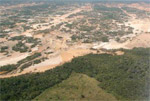Brazilian authorities are seeking 2 billion reals ($1.2 billion) in fines against 14 companies accused of buying beef sourced from ranches that have illegally cleared Amazon rainforest or exploited workers in the state of Acre, reports AFP.
Federal prosecutors in Acre say that illegal beef will generate a 500 real ($300) fine per pound sold. The action comes after more than a year of efforts to engage the beef industry.
Authorities singled out JBS-Friboi, the world’s largest meatpacker. They noted that the firm has continued to buy meat from ranches that use slave labor and chop down rainforest.
Brazil’s environmental enforcement agency IBAMA is also named in the suit. Prosecutors say the agency failed to enforce environmental saws.
The news comes nearly two years after Brazil’s biggest meatpackers agreed to a moratorium on new forest clearing for cattle production. The agreement was spurred by a Greenpeace campaign that linked some of the world’s most prominent brands #8212; Nike, Timberland, and Adidas #8212; to deforestation in the Amazon rainforest. The companies responded by refusing to buy cattle products unless they were shown to be free of deforestation.
Related articles
Corporations, conservation, and the green movement

(10/21/2010) The image of rainforests being torn down by giant bulldozers, felled by chainsaw-wielding loggers, and torched by large-scale developers has never been more poignant. Corporations have today replaced small-scale farmers as the prime drivers of deforestation, a shift that has critical implications for conservation. Until recently deforestation has been driven mostly by poverty—poor people in developing countries clearing forests or depleting other natural resources as they struggle to feed their families. Government policies in the ’60s, ’70s, and ’80s had a multiplier effect, subsidizing agricultural expansion through low-interest loans, infrastructure projects, and ambitious colonization schemes, especially in the Amazon and Indonesia. But over the past two decades, this has changed in many countries due to rural depopulation, a decline in state-sponsored development projects, the rise of globalized financial markets, and a worldwide commodity boom. Deforestation, overfishing, and other forms of environmental degradation are now primarily the result of corporations feeding demand from international consumers. While industrial actors exploit resources more efficiently and cause widespread environmental damage, they also are more sensitive to pressure from consumers and environmental groups. Thus in recent years, it has become easier—and more ethical—for green groups to go after corporations than after poor farmers.
Concerns over deforestation may drive new approach to cattle ranching in the Amazon

(09/08/2009) While you’re browsing the mall for running shoes, the Amazon rainforest is probably the farthest thing from your mind. Perhaps it shouldn’t be. The globalization of commodity supply chains has created links between consumer products and distant ecosystems like the Amazon. Shoes sold in downtown Manhattan may have been assembled in Vietnam using leather supplied from a Brazilian processor that subcontracted to a rancher in the Amazon. But while demand for these products is currently driving environmental degradation, this connection may also hold the key to slowing the destruction of Earth’s largest rainforest.














